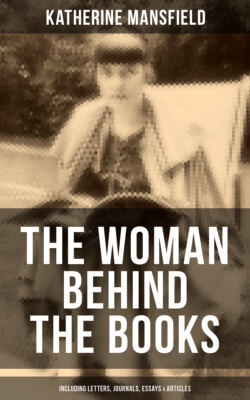Читать книгу Katherine Mansfield, The Woman Behind The Books (Including Letters, Journals, Essays & Articles) - Katherine Mansfield - Страница 45
На сайте Литреса книга снята с продажи.
2
ОглавлениеEvery morning on their way to Queen’s College, the “compounders” saw two figures slowly moving far down Wimpole Street, but they were too familiar to attract attention. Every morning for years they had gone down Wimpole Street to 45 Harley Street — one leaning upon the arm of the other. They were the Baker girls, May and Ida, daughters of Colonel Baker, a Welbeck Street doctor. They had been “compounders” at Queen’s since Ida was seven.
The two were utterly unlike. May, crippled from an accident in infancy when Colonel Baker was stationed as army doctor at Burma, was alert, decisive; Ida Constance, tall, bending toward May, as May leaned upon her arm, moved with the abstract air of one whose spirit is absent. It was not that she was dreaming, or living in some past or future episode real or imagined; not that she lived in Burma while she walked down Wimpole Street. It was rather that she had not yet lived anywhere — that she waited in a state of suspension. Since there were in her the elements of a living, growing being, she herself was dimly conscious of this void. It may have been a vague awareness — unfocussed as yet — a diffused hunger of the soul. She was unself-conscious, and almost wholly undeveloped at fourteen; but she turned, magnetised, towards the vitality in certain strong personalities. Through them, when she could make the connection, she had momentary glimpses; in those instants she found fulfilment; but the contact gone, she lapsed again into abstraction.
There was a time, later, when she and Katherine rode together in taxis which Ida provided as a convenience and a luxury; and Katherine — looking up through the gloom to the bright little taxi mirror — saw Ida’s anxious eyes staring out, dark from her white face, and cried:”Oh! Your face looks like a lemon!” The pale oval seemed to hang suspended in the dark taxi, and she was frightened of it — or not — as the moment seized her. Sometimes she was afraid to look. Yet she forced her chin up until her eyes met the mirror, just as she forced herself to drain every experience — lovely and fearful — to take its full meaning into her until she had passed through it; and all the while a part of her was looking on, aloof — seeing it as a writer — recognising it as “material.” Years afterward, in The Daughters of the Late Colonel, she found use for this moment :
“And Constantia, pale as a lemon in all that darkness, said in a frightened whisper, ‘Done what, Jug?’”
Katherine always felt she “could write endless stories about her.”
At other times, all was taken for granted. The tall girl, with a mane of fair hair to her waist, solicitous of the sister, was rather like a nun, with her abstract air — like a Sister of Charity. She had promised her mother that she would care for May; and Ida would have given anything for her mother’s sake — understanding, as she looked on, her mother’s protective love for May, and May’s return of passionate devotion.
Mrs. Baker was the centre of their home; she might have been said to be the whole meaning of it during the time the girls were in the primary school at Queen’s. Dr. Baker was “difficult,” but his wife seemed to understand him, and he to depend completely upon her. In her relation to the children she was unusual in her day. Most English homes of their station kept on the nurse, and took a governess; their friends the Paynes, whose father was a physician in Welbeck Street, seldom saw their parents; but Mrs. Baker, from preference, filled both positions herself, besides managing the house. She dismissed the nurse when the children were still small, and she sat with them, teaching and reading to them and kept the circle very close. Each of the four had a special need of her — her husband from his tempera- ment, May to supplant her physical disability, Ida to fill her indefinable seeking. The brother was still a little child.
During the January holidays of 1913, about the time that the Beauchamp family sailed from Wellington “home” to England, Mrs. Baker went with her children for a holiday in the country. Before the January term opened again, she had died from typhoid fever.
